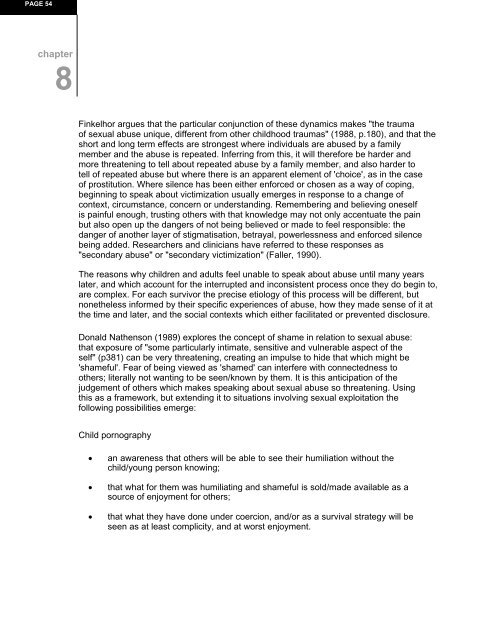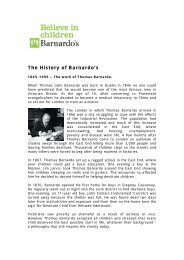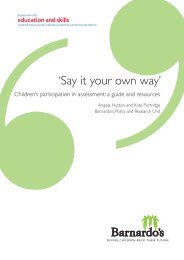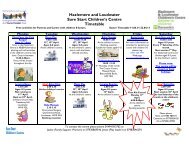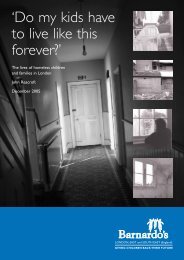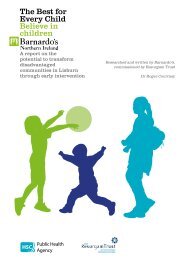Splintered Lives - Barnardo's
Splintered Lives - Barnardo's
Splintered Lives - Barnardo's
Create successful ePaper yourself
Turn your PDF publications into a flip-book with our unique Google optimized e-Paper software.
PAGE 54<br />
chapter<br />
8<br />
Finkelhor argues that the particular conjunction of these dynamics makes "the trauma<br />
of sexual abuse unique, different from other childhood traumas" (1988, p.180), and that the<br />
short and long term effects are strongest where individuals are abused by a family<br />
member and the abuse is repeated. Inferring from this, it will therefore be harder and<br />
more threatening to tell about repeated abuse by a family member, and also harder to<br />
tell of repeated abuse but where there is an apparent element of 'choice', as in the case<br />
of prostitution. Where silence has been either enforced or chosen as a way of coping,<br />
beginning to speak about victimization usually emerges in response to a change of<br />
context, circumstance, concern or understanding. Remembering and believing oneself<br />
is painful enough, trusting others with that knowledge may not only accentuate the pain<br />
but also open up the dangers of not being believed or made to feel responsible: the<br />
danger of another layer of stigmatisation, betrayal, powerlessness and enforced silence<br />
being added. Researchers and clinicians have referred to these responses as<br />
"secondary abuse" or "secondary victimization" (Faller, 1990).<br />
The reasons why children and adults feel unable to speak about abuse until many years<br />
later, and which account for the interrupted and inconsistent process once they do begin to,<br />
are complex. For each survivor the precise etiology of this process will be different, but<br />
nonetheless informed by their specific experiences of abuse, how they made sense of it at<br />
the time and later, and the social contexts which either facilitated or prevented disclosure.<br />
Donald Nathenson (1989) explores the concept of shame in relation to sexual abuse:<br />
that exposure of "some particularly intimate, sensitive and vulnerable aspect of the<br />
self" (p381) can be very threatening, creating an impulse to hide that which might be<br />
'shameful'. Fear of being viewed as 'shamed' can interfere with connectedness to<br />
others; literally not wanting to be seen/known by them. It is this anticipation of the<br />
judgement of others which makes speaking about sexual abuse so threatening. Using<br />
this as a framework, but extending it to situations involving sexual exploitation the<br />
following possibilities emerge:<br />
Child pornography<br />
�� an awareness that others will be able to see their humiliation without the<br />
child/young person knowing;<br />
�� that what for them was humiliating and shameful is sold/made available as a<br />
source of enjoyment for others;<br />
�� that what they have done under coercion, and/or as a survival strategy will be<br />
seen as at least complicity, and at worst enjoyment.


